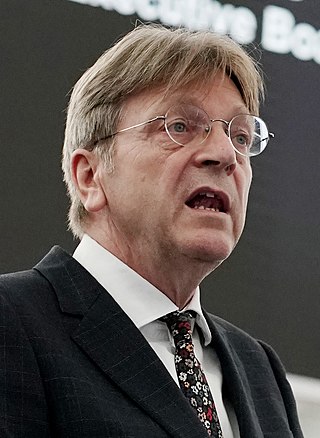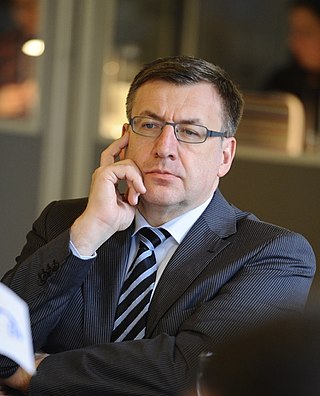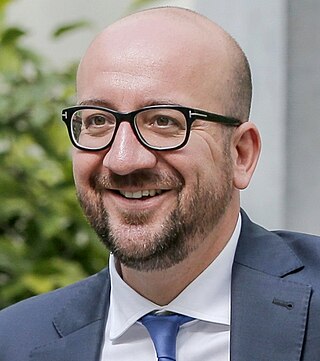
The politics of Belgium take place in the framework of a federal, representative democratic, constitutional monarchy. The King of the Belgians is the head of state, and the prime minister of Belgium is the head of government, in a multi-party system. Executive power is exercised by the government. Federal legislative power is vested in both the government and the two chambers of parliament, the Senate and the Chamber of Representatives. The federation is made up of (language-based) communities and (territorial) regions. Philippe is the seventh and current King of the Belgians, having ascended the throne on 21 July 2013.

Guy Maurice Marie Louise Verhofstadt is a Belgian liberal politician and an advocate of a Federal Europe. He is a former prime minister of Belgium. He has been a member of the European Parliament (MEP) from Belgium since 2009.

The Kingdom of Belgium is divided into three regions. Two of these regions, Flanders and Wallonia, are each subdivided into five provinces. The third region, Brussels, does not belong to any province and nor is it subdivided into provinces. Instead, it has amalgamated both regional and provincial functions into a single "Capital Region" administration.

Groen, founded as Agalev, is a green Flemish political party in Belgium. Its French-speaking equivalent is Ecolo; the two parties maintain close relations with each other.

The New Flemish Alliance is a Flemish nationalist and conservative political party in Belgium. The party was established in 2001 by the right-leaning fraction of the centrist-nationalist People's Union (VU).

The Parliament of the Brussels-Capital Region, is the governing body of the Brussels-Capital Region, one of the three regions of Belgium. It is also known as the Brussels Regional Parliament.

The area within Belgium known as Brussels-Halle-Vilvoorde encompasses the bilingual—French and Dutch—Brussels-Capital Region, which coincides with the arrondissement of Brussels-Capital and the surrounding Dutch-speaking area of Halle-Vilvoorde, which in turn coincides with the arrondissement of Halle-Vilvoorde. Halle-Vilvoorde contains several municipalities with language facilities, i.e. municipalities where French-speaking people form a considerable part of the population and therefore have special language rights. This area forms the judicial arrondissement of Brussels, which is the location of a tribunal of first instance, enterprise tribunal and a labour tribunal. It was reformed in July 2012, as part of the sixth Belgian state reform.

Steven Vanackere, is a Belgian politician from Flanders and member of the Christian Democratic and Flemish party (CD&V). He held the portfolios of Deputy Prime Minister of Belgium and Minister of Foreign Affairs and Institutional Reform in the Leterme II government. He is the son of Leo Vanackere, who, following a political career as a Member of the Chamber of Representatives and the Senate of Belgium, became the Provincial Governor of West Flanders in 1979. His grandfather, Remi Wallays, had also been a senator and had been a former Mayor of Wevelgem.

The government of the Brussels-Capital Region is the political administration of the Brussels Capital Region of Belgium. An election is held every five years. The government is headed by a Minister-President, four ministers and three state secretaries.

Alexander De Croo is a Belgian politician and businessman who has served as the prime minister of Belgium since October 2020.

Jan Jambon is a Belgian politician of the New Flemish Alliance (N-VA) who has been serving as Minister-President of Flanders since 2019. He replaced Kris Peeters as a member of the Belgian Chamber of Representatives in 2007. The N-VA was, at that time, partnered with the Christian-Democratic and Flemish party. In June 2010 and May 2014 he was re-elected on an N-VA list.

Federal elections were held in Belgium on 25 May 2014. All 150 members of the Chamber of Representatives were elected, whereas the Senate was no longer directly elected following the 2011–2012 state reform. These were the first elections held under King Philippe's reign.
Regional elections were held in Belgium on 25 May 2014 to choose representatives for the Flemish Parliament, Walloon Parliament, Brussels Parliament and the Parliament of the German-speaking Community. These elections were held on the same day as the 2014 European elections as well as the 2014 Belgian federal election.

The Michel I Government was the Federal Government of Belgium formed following the 2014 Belgian government formation and sworn in on 11 October 2014. The administration was a centre-right coalition of the New Flemish Alliance (N-VA), the Christian Democratic and Flemish (CD&V), the Open Flemish Liberals and Democrats and the Reformist Movement (MR). The prime minister was Charles Michel. The government had an agenda of socio-economic reforms, especially through austerity measures, with its priorities being improving Belgium's economic competitiveness and reducing unemployment. It fell in December 2018 over the Global Compact for Migration.

Federal elections were held in Belgium on 26 May 2019, alongside the country's European and regional elections. All 150 members of the Chamber of Representatives were elected from eleven multi-member constituencies.

The 2019 Belgian regional elections took place on Sunday 26 May, the same day as the 2019 European Parliament election as well as the Belgian federal election.
This page is based on this
Wikipedia article Text is available under the
CC BY-SA 4.0 license; additional terms may apply.
Images, videos and audio are available under their respective licenses.















